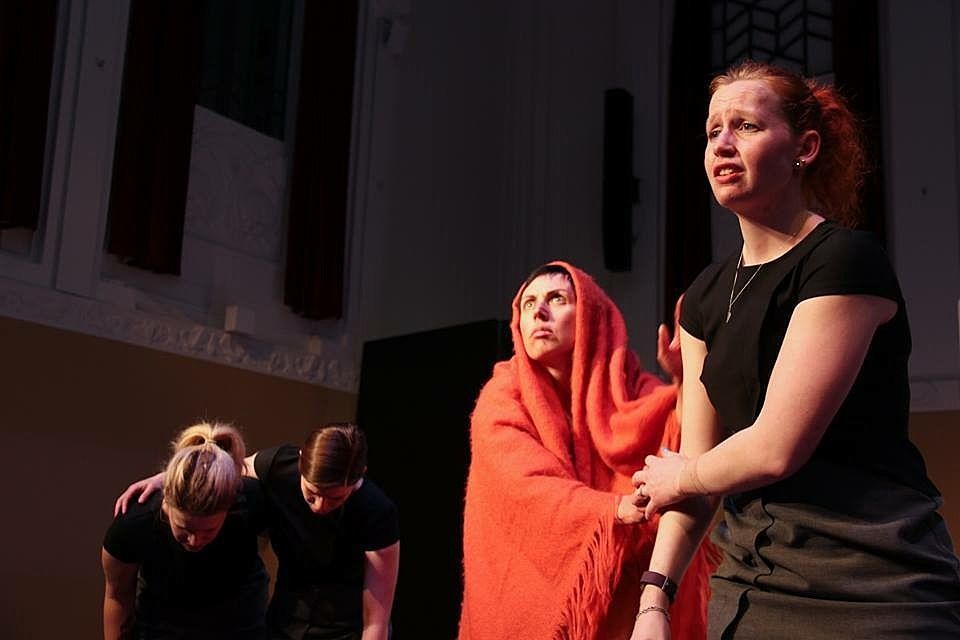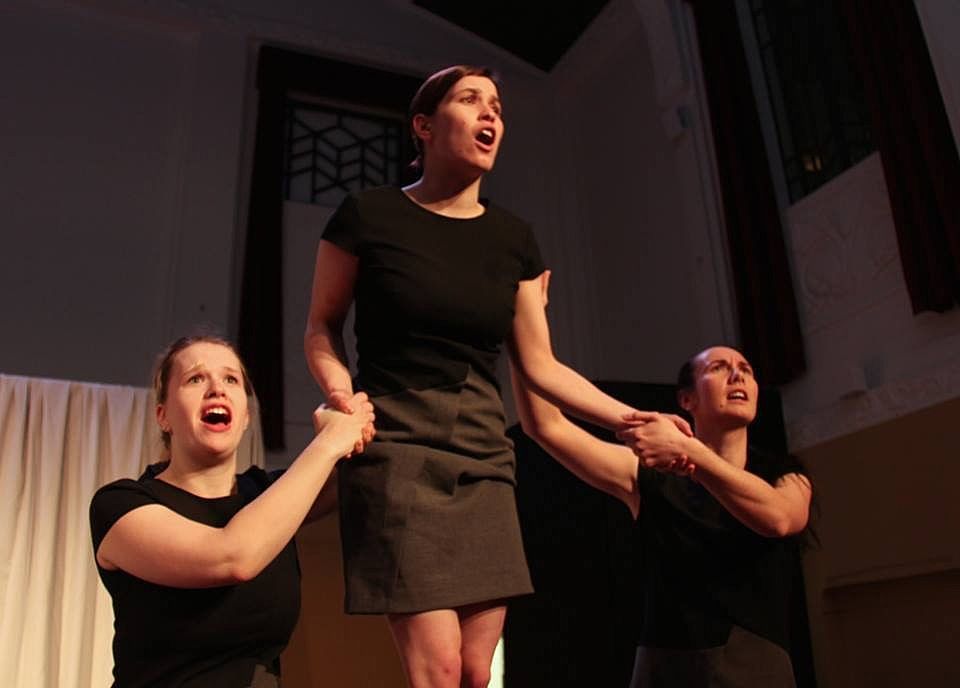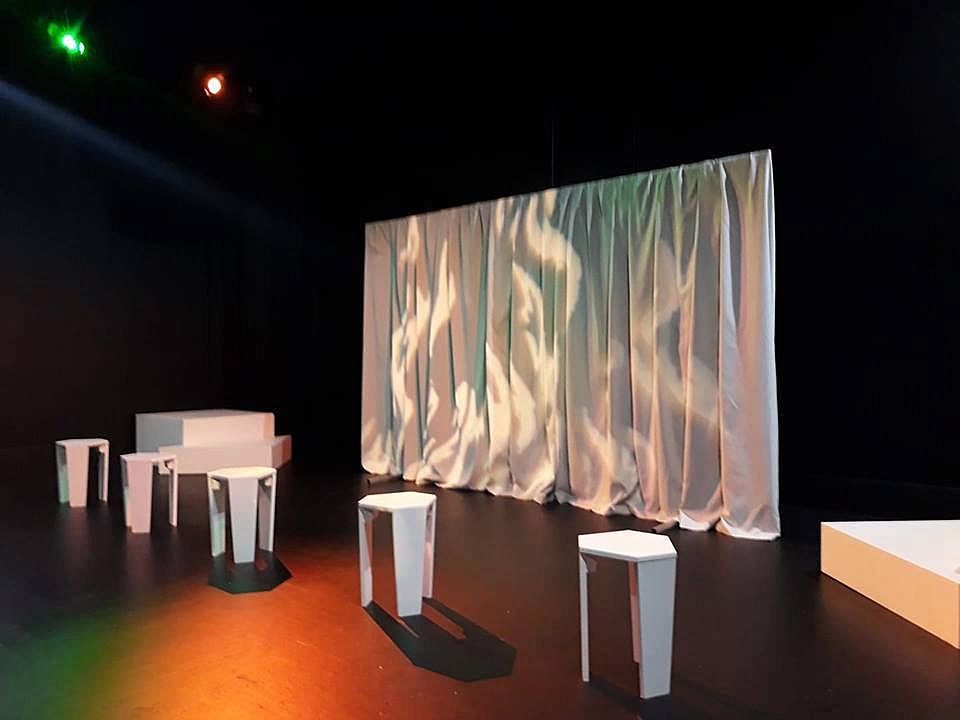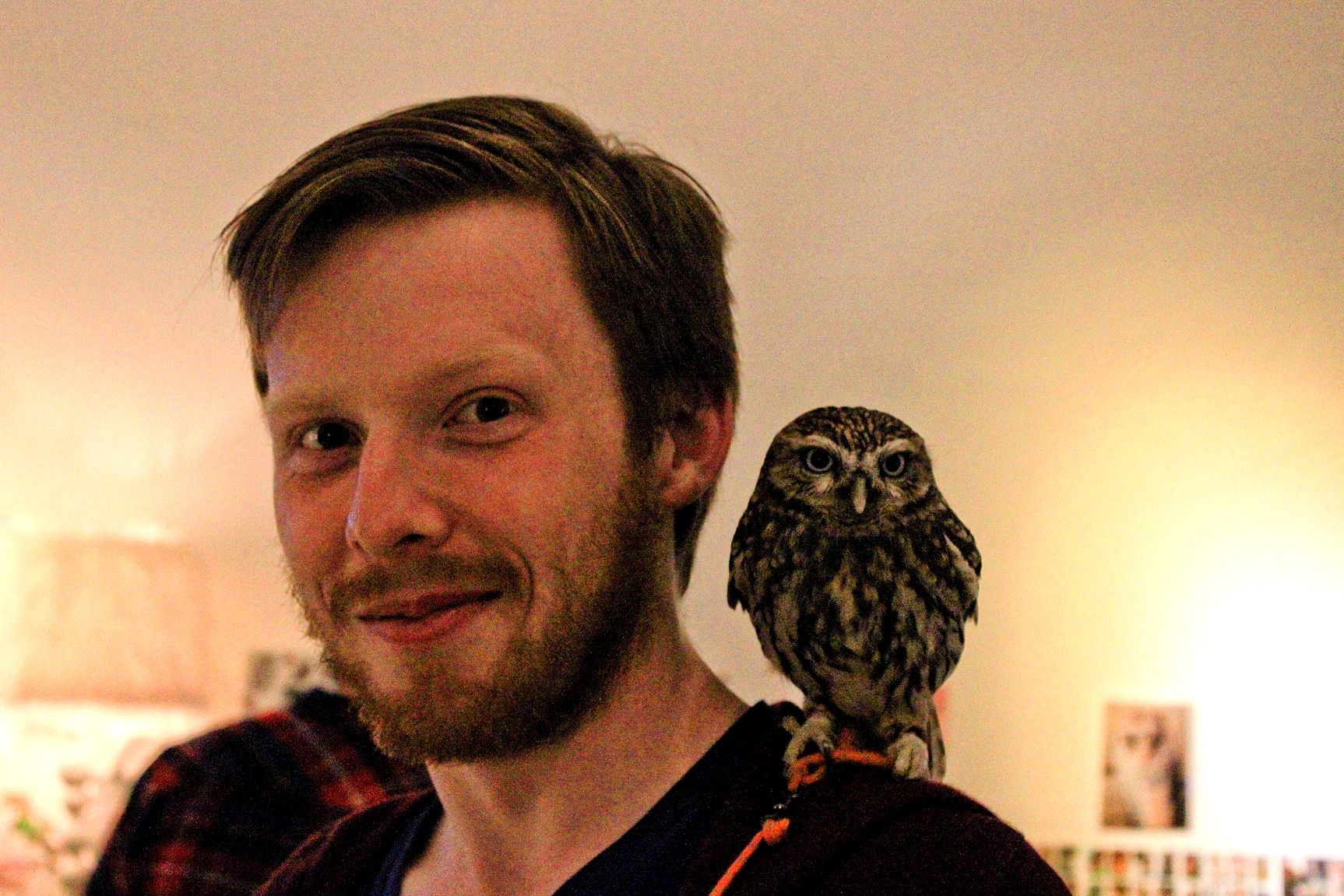Shouting 'Who Am I?' In A Crowded Theatre: A Review of Among Strangers
Adam Goodall reviews a new trio of short plays by prolific Palmerston North-based writer Angie Farrow, now at BATS Theatre.
Adam Goodall reviews a new trio of short plays by prolific Palmerston North-based writer Angie Farrow, now at BATS Theatre.
In Angie Farrow’s Among Strangers, people are who they say they are. We know their hopes, dreams, fears, doubts, likes and dislikes. We know how they’re feeling moment to moment because they readily describe how they’re feeling moment to moment in great detail. And while they’re regularly, literally asking themselves “Who am I?” and “What am I looking for?”, their words betray them. That’s because in all three of the short plays in this season – Breaking News, Esther and August Moon – Farrow’s words aren’t much more than tools. Their sole function is to communicate a character’s identity at that point in time. You want to lie, or doubt yourself, or keep something ambiguous? Best not talk at all.
Farrow’s a prolific playwright based out of Palmerston North. She often writes about ordinary, oblivious people who discover that the world outside their door is much closer than they thought – and that they are just as responsible for it, and the people they share it with, as anyone else. That throughline unites all three of the plays in Among Strangers, performed here by a nine-strong ensemble of women. In the first, Breaking News, a vain, high-flying newsreader has a vision of war that recalibrates her moral compass. In Esther, a missing girl inexplicably returns home after three years, unable (or unwilling) to speak; her arrival destabilises the lives of everyone in her small privileged town. The third and the longest, August Moon, tags along with the titular girl as she tries to find her missing mother, a well-respected Green MP.
August’s mother is meant to be speaking at a rally for the homeless that afternoon, so August, a precocious Sheldon Cooper type, finds herself reluctantly trapped in an unwanted race against time. She hits up friends, family and community organisations for help, but to no avail. Through these meetings, though, she starts to pick up that if her mother has disappeared, it might just be her fault.
August Moon is a slight work and it has its moments. Hannah Pratt is charming and funny as August’s blazed-up grandma, and its central message about listening to, understanding and staying in tune with the people around you is simple, sweet and played without irony or apology. However, it’s so tepidly paced that it’s difficult to get into its groove. The dialogue gets caught in repetitive loops, like when August runs into her mother’s assistant, Moana –
MOANA: She’s meant to be at the rally!
AUGUST: What rally?
MOANA: What rally?! The rally! The rally everyone’s going to be at!
– and the ensemble pauses and draws out their syllables like they’re pantomiming for a younger audience that needs more time to process what’s happening and why it’s funny.
Breaking News and Esther don’t feel like they’re geared at children in the same way, but they also carry some of that frustrating slowness. That’s especially clear in Esther, a mystery that almost entirely ignores its chief detective (Esther’s suspicious sister Jess) in favour of a steady stream of wordy scenes in which unnamed townsfolk get skeptical about Esther but then suppress it because, as Farrow bluntly puts it, “to admit her strangeness would be to admit the strangeness in ourselves.”
Slowness isn’t a problem in itself, but Farrow’s narratives don’t have the detail or, really, the ambiguity to carry a patient pace. Farrow’s not hiding any secrets and she’s not really all that interested in her characters’ depths. From start to end of Esther we learn very little about Jess or her quarry. In Breaking News, we get two scenes between Jolene and her lover Sid: the first suggests that they’re at breaking point (Jolene doesn’t want to be seen in public with Sid because their relationship is not in line with her “public image”) and the second resolves their crisis tangentially, a byproduct of something bigger.
Farrow frequently namedrops places like Syria and references the real-world explosion of anti-Muslim racism in white communities. But when Middle Eastern characters are given a chance to speak, they speak in a “mythic” language that Farrow’s invented to sound vaguely of the region.
Farrow’s more interested in telling fables, really, allegories with a strong moral take-away. That makes the moral and political judgments in Among Strangers especially difficult to swallow. All three shows feel dated at best, and that’s not just because of the references to the Manawatu’s main broadsheet (the Evening Standard hasn’t been called that since at least 2009) and the young people talking about their ‘mobile phones’. Take August Moon. August’s mum Erica is a good-hearted Green MP popular because of her advocacy for the homeless. Farrow even gives her a whole speech, which is repeated by August, to show us how good she is at advocating for their rights.
Erica’s speech is vague on the personal and the political, though, a wan call for us to “stop demonising the homeless.” It’s also immediately undercut by Farrow’s jokes about the scale of this rally that’s meant to be a ‘game-changer’. “Some of these people,” August tells her mother, “came all the way from Eketahuna.” The nail in the coffin is the play’s only homeless character, an ornery alcoholic that Erica’s taken in. When Erica goes missing at the start of the play, the homeless woman barely seems to care, stumbling around the house yelling about how she can’t live without her strawberry jam. She’s played as a moocher and a joke, and that’s all we ever know her as because we never see her again.
The most confusing strain of conservatism is in Breaking News and Esther. Both plays are ostensibly parables about paying attention to the world around you and pushing back against apathy and bigotry, especially toward people from other nations. Farrow frequently namedrops places like Syria and references the real-world explosion of anti-Muslim racism in white communities. But when Middle Eastern characters are given a chance to speak, they speak in a “mythic” language that Farrow’s invented to sound vaguely of the region. It’s a baffling and deeply ignorant choice that otherises Middle Eastern people and treats them as fantastical. To do this in didactic stories about how bourgeois white people need to break out of their comfortable bubbles and pay attention to the suffering outside? There's a really grim irony to the white saviour complex on display and it's especially hard to stomach in a show that runs for two hours and change.
This conservatism bleeds into the form. There’s a lot of chorus work, but director Tracey-Lynne Cody’s literal-minded vision uses her large, incredibly game ensemble in largely conventional ways. Jolene is lifted up in a throne-shaped pile to yell “WHO AM I?” into the ether; when the townsfolk are scrutinising Esther, the actors form a circle around her and push her from side to side. There’s even a five minute changeover between the first two plays so that the dedicated stage manager can move four white boxes to one corner of the stage.
There’s a part at the start of August Moon when August freaks out that her mother might have been kidnapped by Bulgarian terrorists. Her sister Tracey mocks her: that’s the plot of Taken, and besides, “There aren’t any human traffickers in the Aro Valley.” This errant bit of Wellington flavour is jarring – the rest of the play hasn’t been localised and it’s never really clear what it’s doing there. It’s a small thing, sure, but it’s confusing and annoying all the same. But Among Strangers is so full of these small things that it stops feeling like a trickle and starts feeling like a deluge. It’s really hard to ignore a deluge.
Among Strangers runs from 26 to 30 September at BATS Theatre.
Tickets available here.



